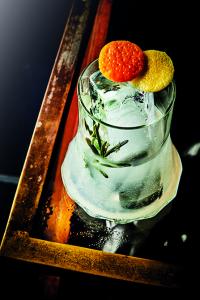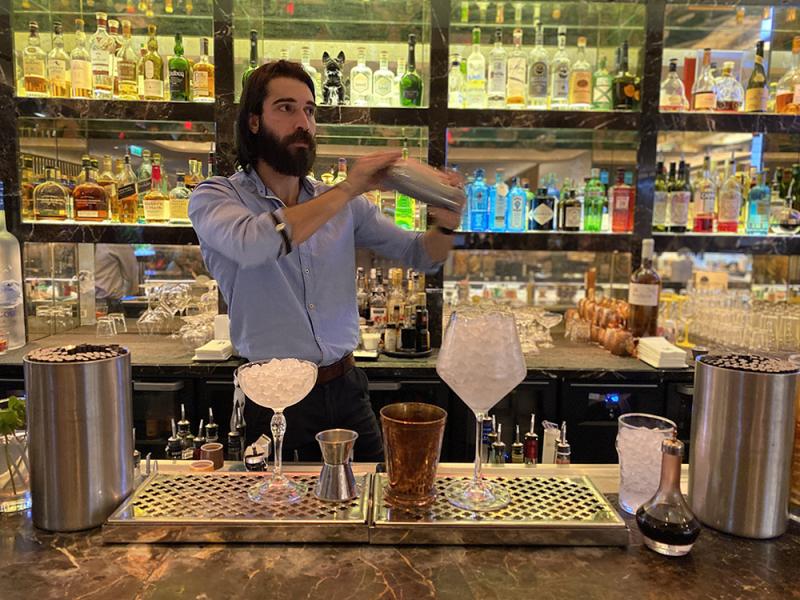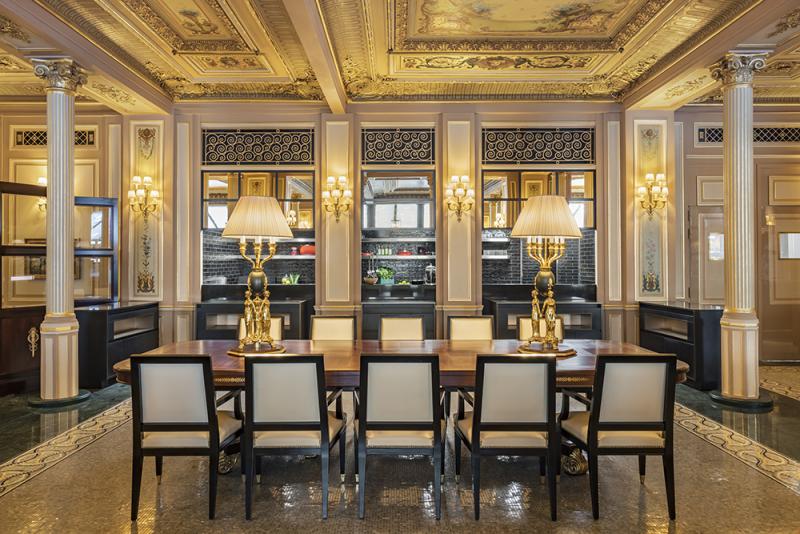As Paris is synonymous with refined lifestyles, timeless fashion, and haute cuisine, is it any surprise that the cocktails are going to follow suit?
While Paris bars have adapted to a post-2020 world in terms of simpler cocktails and menus, greater safety concerns, and the procurement of essential ingredients, the bartenders continue to deliver drinks with a certain flair. We spoke with three Paris establishments—L'Alchimiste, Le Drugstore, and the InterContinental Le Grand Hotel—that have addressed the challenge of keeping things fresh while delivering quality that’s consistent and timeless.
L’Alchimiste
Some names in the bartending world travel well, and “Matthias Giroud” is one of them. As he was born in the French West Indies and came of age traveling the world with his expatriate parents, he inevitably developed a sense of adventure and a taste for international flavor profiles. This, in turn, gave him a leg up when he began his bartending career in Paris in 1998. The way he balances a formidable culinary legacy with more current global influences, certainly played a role in reestablishing Paris as one the world’s great bar cities. Under his “bar chef” direction, many Paris bars that have become global household names include Bar Fly Paris (his first post), Bound, Buddha Bar, Barrio Latino, and Barlotti Paris.
As Giroud’s reputation as a cocktail (and mocktail) alchemist grew, he brought his Midas touch to lounges, clubs, and hotel bars in the U.S. (New York, Las Vegas) and major cities on six continents. He even had a hand in creating the cocktail dictionary, La Petite Bibliothèque des Cocktails Larousse. He launched a dozen cocktail brands within his work for Paris’ George V Eatentertainment Group, and conceived his L’Alchimiste business, which stages cocktail classes for pros and home enthusiasts and offers exquisitely packaged cocktail kits capturing his greatest hits originally created for top Paris clubs.
Giroud refers to his L’Alchimiste headquarters, located outside the city center in the suburb of Boulogne-Billancourt, as a “unique place between an artist’s workshop, a chef’s kitchen, an experiential bar, and an herbalist [that’s] open to the world.” Whether he’s marketing his cocktail kits to customers or consulting and developing cocktails and mocktails for bars, the objective is to take the customer on a “voyage.” He has a few thoughts to share with his American compatriots about what fashion, flavor, and bar management trends from Paris will be arriving on our shores in 2023 and beyond based on what’s come out of WMSignature, his operational management consulting agency.“The food & beverage industry is going through a period of mutation,” Giroud observes. “Consumers–especially millennials–are always looking for new tastes and experiences, and thus, have turned this world [into] their playground. These ‘early adopters’ are concerned about the quality, the authenticity of products, and exclusivity of mixes. They are the ones who drive this profound change in the F&B market by launching trends on social networks and democratizing them with their followers #foodart #cocktailsart #drinks. However, what’s most important, of course, is that all of our restaurant-bar partners’ [our clients’] guests are happy. When all of their staff are really happy, in turn, [they will continue to] work and grow with us and be proud of what they do.”
Giroud says that management and lead bartenders at a successful bar, no matter where it is located in the world, must treat all members of the bar team like collaborators. “When I open a place or consult on the drinks menu, I take a lot of things from the bar team, and I give something back to them,” he says.

“We always exchange and analyze ideas with the chef and the F&B management of a client property to create real bespoke experiences. To make these ideas materialize, the next step is to organize very good training with all the team to explain all the experiences step-by-step along with the stories that make things interesting for customers. To ensure our [custom menus] are unique to each client, I offer the team members some things from my experience, and I encourage them to share something from theirs. I ask them what they think about the way something is done because they know their guests more than me. They know their workplace, and I adjust.”
In other words, the best professional bartender is adaptable. “If I take one guy from my team and install him at a client’s nightclub or luxury hotel bar, whether the focus is original or classic cocktails, he can work in each place without any problem.”
Since the pandemic, Giroud’s kits and bottled cocktails have provided a new source of inspiration, creativity, sustainability, and resourcefulness for both consumers and professionals. He notes that alcohol-free cocktails, in particular, are growing in popularity, and can offer bartenders a “very important and stimulating universe” that can enable him or her “to create experiences that are multicultural and multigenerational.” Beyond the quality of what goes into a drink, it’s the experience of enjoying it that will make a venue successful.
This can be accomplished by encouraging creativity and inventiveness by pushing the boundaries of sensory elements, such as flavors, aromas, and texture. On the website for Kuantom, one of his clients which produces mixers for the professional market, Giroud recommends his peers focus more on the taste and aesthetics of the cocktail, and no longer only on alcohol.
“Mixology is increasingly inspired by gastronomy...discovering new, more complex flavors. We fetch the products, macerate them, infuse them, work them, cook them,” he affirms. “What inspires me is the work of the product itself. How far can I take a given ingredient, such as a lemon? For years, I worked the juice and zest of this lemon. In tomorrow's cocktail, I will want to see how I can go further and work the product differently. I'm going to ask myself: If I can do something with the peel? It is through this creative and aspirational aspect that I envision the cocktail of tomorrow.”
Giroud also recommends that beverage programs focus on local ingredients and sustainability. “We also really must try to create experiences with local products and promote local suppliers, as the customers demand this be part of the experience,” he explains. “In the past, [beverage programs] were created around some big brands. However, our clients and bars in general should recognize we have more choices with small suppliers, who can spark our creative process. We also should integrate ‘zero waste' practices in our ‘collections’ for our restaurant-bar partners. I really think it’s a similar goal for around the world, the U.S. included.”
Le Drugstore
Even in Paris, you cannot stop change for better or for worse. Most visibly, the Champs Elysee has mellowed into a tourist thoroughfare that’s comfortably mainstream in a similar vein to New York City’s Times Square and the Las Vegas Strip. In contrast, Le Drugstore, at the crossroads of the Champs Elysee and the Arc de Triomphe, continues to be a destination radiating innovation and sophistication in a way that would make its founder, advertising maverick Marcel Bleustein-Blanchet, proud. When he devised Le Drugstore in 1958, Bleustein-Blanchet envisioned it as an international meeting spot where stylish Americans, Parisians, and other travelers would commune over a martini and a steak musing how far they had come since World War II.
For over half a century, Le Drugstore has seen its ups and downs. However, in the hands of Michelin three-star chef Eric Frechon, it now honors its roots while redefining the notion of travel that shaped it. While American staples are still present (Louisiana fried chicken breast, Barbecued Pork Ribs with Grilled Corn, and a classic cheeseburger), the bulk of the menu is a full-on globe-trotting adventure that incorporates and blends Asian, Latin American, and Middle Eastern influences.
The best appetizers on Frechon’s menu (crispy broccoli and curry butter sauce; salmon tartare with yuzu and yellow chili; carpaccio of marinated sea bass, vanilla, chili and grilled avocado; and tempura-battered corn corn sprinkled with tandoori seasoning) are excellent foils for bartender Nicholas Usselmann’s glamorous cocktails. “Le Sprummer” (with French-distilled Gin Anaë, house-made verbena syrup, lemon juice, and champagne), “L'Été Indien,” and the Maple Julep (among others) capture the happy, fizzy Parisian cocktail culture of the 1950s while adding modern spins in keeping with the decor and American steakhouse-inspired main courses.
“We think that Americans have history on their side because cocktails originated in that part of the world,” reflects Usselmann on how bars have moved away from theme trends like the “Speakeasy” and towards more substantive things like higher quality brands of spirits. “The English, many London bars in particular, have reputations based on the ultimate guest approach and great mixologists. While Paris has some great venues, I would say that we can always improve how we do things.”

Usselmann points to the way he and his bar team work collaboratively to create original spins on Champagne-based cocktails and offer a menu with both originals and classics that’s in keeping with Le Drugstore’s specific ambiance and the creativity of the food menu. As he laments that some bars are, “more commercial than authentic,” interactions between the bar staff and guests–locals and visitors alike–are critical in keeping Le Drugstore relevant. Supply chain concerns are also solidifying a focus on French products for the various cocktail recipes.
“For the past two years, we have been struggling with [sourcing] some products like Japanese whiskies, tequila, agave, and, most recently, Russian vodkas,” he continues, noting that Champagne cocktails reign supreme on the menu and rum-based cocktails, such as the signature Old Cuban cocktail, are going strong. “We have some products quite specific to France such as Cognac, Armagnac, Calvados, herbal liquors like St Germain, Chartreuse, Pastis, Absinthe, and others we’re incorporating into recipes. We are also making an effort to adapt to certain supply chain issues and sustainability practices, such as dehydrating fresh fruits to reduce the waste.”
Even with many innovations [such as digitized menus] finding their way into bars of all stripes, Usselmann doubles down on the importance of basing Le Drugstore’s “guest approach” on human contact and communication. He estimates that about 20% of the clientele are regulars, but their expectations are similar to the out-of-town visitors.
“People visiting the city come to us on the first days of their stay, and fortunately for us, they will come back again after trying out different places in the city,” he says. “Comments on social media also motivate us to [continue our approach to] serving our clientele the way we have been doing.”
InterContinental Le Grand Hotel
One can argue that the same holds true for LE BAR and Cafe de la Paix at the InterContinental Le Grand Hotel Paris. After more than 160 years, its Cafe de la Paix continues to be a destination separately and within the boundaries of the hotel experience. According to bar director Kevin Fernandes, the standards for the cocktails and spirits offered are as high as the offerings on the food menu.“They are constantly in collaboration with the restaurant teams and with the Chef from the creation of the menu, which varies according to the season,” he explains. “As far as the difference in clientele is concerned, both the local clientele and the hotel guest are important to us. We evaluate the success of the bar-restaurant through various key indicators such as guest feedback and reviews, media reviews, margins and benefits, word of mouth, social media, and brand awareness/notoriety.”

According to Fernandes, the customer experience starts before customers arrive and continues after they leave, and it is a primary goal that can be constantly improved through several strategies. To assure regulars, hotel guests, and tourists coming in from the outside have the best experience possible, the food and beverage teams work on the relationship with these varied clients and the personalization of exchanges between customers and staff. To enhance the customer experience, he notes they also use social media as it has become an “important technology” that’s an integral part of the customer experience nowadays.
“It allows us to facilitate the relationship and be in direct [contact] with the customers, and to make them discover our property,” he points out, adding that they can inspire their American hotel bar/restaurant manager counterparts to adopt “our French ‘savoir-faire’ as well as an appreciation for our heritage and that of our ancestors with the history that is associated with the cocktail. For example, the dry martini, a recipe based on gin, dry vermouth, and garnished with a cherry, attests to a version created at the Grand Hotel bar in 1904.”
Delivery costs and the costs of raw materials are among the highest as they are in the U.S., based on Fernandes’ observations. However, no matter where one is based, consistency in business relationships is instrumental in keeping costs down.
“We use a global distribution network which helps to reduce costs,” he continues. “We generally work with the same suppliers in our different IHG Parisian hotels and order our products in large quantities. This strategy allows us to have a greater bargaining power. The last few months have been particularly impactful economically. In addition, the opening hours of our bar have recently evolved, which means that the quantities have increased and created new challenges for our teams.”
The “ethical approach” of Hotel Le Grand involves practices based on sourcing local, organic, and plant-based ingredients and the importance of avoiding food waste. Food menus are prepared according to the seasonality of the products, most of which are local. For example, he uses honey from producers in the Paris region, and the beers (white beers and IPA) are also from the Ile de France region. Furthermore, organic products are offered “à la carte,” and a “too good to go” philosophy is applied to reduce food waste in terms of using as much of the fresh ingredients as possible.
“Environmental sustainability and inclusion in terms of human resources are values and goals that we share with the U.S. market in the luxury hotel sector,” he affirms. “Indeed, customers in this segment who have the opportunity to travel around the world are increasingly concerned about these issues and challenges.”
Plan to Attend or Participate in the Vibe Conference, Feb. 27 – March 1, 2023
To learn more about the latest trends, issues and hot topics, and to experience and taste the best products within the on-premise beverage community, plan to attend the Vibe Conference, Feb. 27 to March 1, 2023 at the Sheraton San Diego Hotel & Marina. Visit VibeConference.com.
To book your sponsorship or exhibit space at the Vibe Conference, contact:
Fadi Alsayegh Sales & Sponsorships Email: [email protected] Phone: 917-258-5174
Donna Bruns Sales & Sponsorships Email: [email protected] Phone: 936-522-6932
Charlie Forman Sales & Sponsorships Email: [email protected] Phone: 845-262-1041
Connect and follow Questex’s Vibe Conference and community at Facebook and LinkedIn.
